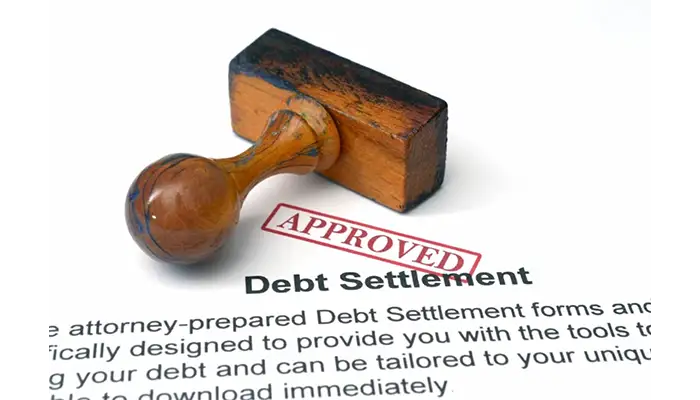If you have an uncomfortable amount of debt and want to improve your situation, congratulations: just by starting to research solutions, you have already taken the first step towards more control.
Outside of bankruptcy, there are two primary ways to reduce your debt burden significantly: debt consolidation and debt settlement (also known as debt resolution). Deciding between the two can profoundly affect your financial recovery, so it is critical to understand them well before taking action.
This comparison gets at the heart of debt consolidation vs debt settlement. We lay out how to choose, what they are, their pros and cons, which situation each is best suited to, and rank a few of the top consolidation lenders and settlement firms who specialize in each.
Knowledge is power – especially in personal finance – so read on to determine which path aligns best with your financial goals.
Key Takeaways 💡
- Debt consolidation simplifies debt repayment and lowers total monthly costs by combining multiple debts into one new loan with a lower APR. It typically requires a good credit score and consistent income to be approved for the most favorable terms.
- Debt settlement involves negotiating with creditors to pay a reduced amount of the owed debt. While it may significantly reduce total amounts owed to creditors, it almost always comes with a heavy cost associated with damaged credit and settlement company fees.
- Different financial situations and goals will dictate whether debt consolidation or settlement is appropriate. Consolidation is generally better for those with a steady income and good credit, and settlement is suited for those in financial distress as a last resort before bankruptcy.
- Debts that consolidation or settlement can help with take many forms, from high-interest credit card debt to medical debt to car loan debt. (Note that federal student loans are off the table: these cannot be consolidated or settled using typical approaches.)
Debt Consolidation vs Debt Settlement: How to Decide
Debt consolidation and debt settlement both share the same goal: to reduce total debt amounts owed and get you out from under debt faster.
However, their approach to that goal is completely different. First, let's describe at a high level what each one is:
About Debt Consolidation
Simply put, debt consolidation is when someone takes out a personal loan to pay off multiple existing debts. The real benefit of debt consolidation is unlocked when the new personal loan being used to pay off the other debts has lower fees/APR than the old debts, which lowers monthly payments and the total cost of the debt.
Aside from lowering the costs of the debt, the other benefit of debt consolidation is simplicity. Instead of having to make payments to multiple creditors each month, you only need to make one, which streamlines finances and makes budgeting easier.
About Debt Settlement
In comparison to debt consolidation's slow and steady approach to debt reduction, debt settlement is much more aggressive. In this situation, you contact your creditors and seek an agreement to pay only part of the principal owed, with the rest being forgiven. This is typically done with a debt settlement firm serving as an intermediary between the creditor and the borrower looking to settle the debt.
As you can see, debt consolidation is about reconfiguring your monthly payments into a more manageable single monthly payment. In contrast, debt settlement is about getting your creditors to reconfigure your debts so that you owe less than the original amount.
It is important to note that these approaches are not interchangeable: different situations and types of borrowers will be better suited for one over the other. Let's dig deeper into each to better understand how each works, who they're best for, and their benefits and drawbacks.
Why Choose Debt Consolidation

This approach is best for: people who are keeping on top of their debt payments, have good credit, and are looking to streamline and shrink their monthly payments
Consolidating debt involves opening a new loan or balance transfer credit card to pay off multiple existing debts, ideally leading to fewer monthly payments and a lower APR (which translates to a lower monthly payment).
A good to excellent credit score is often necessary to qualify for a debt consolidation loan at a competitive interest rate, and collateral like home equity may improve the terms offered.
How Debt Consolidation Loans Works
Most debt consolidation loan programs are personal loans with fixed rates, ensuring consistent monthly payments over the loan term.
In some cases, your personal loan gets deposited into your bank account, and you use the cash to pay off other higher-interest debts. In other cases, lenders offer direct payment to creditors. This can be a more convenient approach, and sometimes lenders will provide a rate discount if they make the payments directly to your creditors on your behalf.
Aside from personal loans, another tool to pay off high-interest debt (such as credit card debt) is balance transfer credit cards. They offer a 0% APR introductory period, providing an opportunity to pay down balances without accruing additional interest.
Balance transfer credit cards are only recommended if you plan to fully pay off the balance before the introductory rate ends. Otherwise, you might find yourself locked into another loan payment with a high variable interest rate, defeating the purpose of the balance transfer.
Acquiring a debt consolidation loan usually requires a Good to Excellent credit score, and may involve extra costs such as origination fees and balance transfer fees, which range from 3% to 5% of the total loan amount.
It is critical that a borrower carefully reviews a debt consolidation loan's fees, interest rate, and repayment terms to confirm it is a wise financial decision before signing a contract.
Pros & Cons: Debt Consolidation
Pros
- Offers a single, predictable monthly payment, making it easier to budget and manage finances
- Reduces the amount of interest paid over time if the new APR is lower than the APR on existing debts
- Reduces your monthly payment if the new APR is lower than the APR on existing debts
- Timely payments on a debt consolidation loan are reported to the credit bureaus and can help boost the borrower’s credit score and credit profile
Cons
- May come with fees, such as origination fees or balance transfer fees
- If the debt consolidation loan has a longer repayment period than existing debts, the borrower may inadvertently pay more in interest over the lifetime of the loan
- If collateral (such as a home or vehicle) is used to secure a lower-APR debt consolidation loan, there is a risk these assets could be lost if the borrower falls behind on payments
- Debt consolidation can fuel the illusion of having more available money, leading to increased spending and additional debt accumulation if underlying financial habits are not addressed
Top Debt Consolidation Loan Companies

Avant
- Lending platform that matches borrowers to multiple lenders at once, making fee and interest rate comparison shopping easier
- Offers personal loan sizes from $2,000 to $35,000
- Ideal for Fair- to Poor-credit borrowers (with a minimum credit score of 560)
- Fast funding, typically within one business day
- Has higher rates (9.95% to 35.99%) and fees than options for those with excellent credit
Upstart
- Offers a wide range of loan sizes from $1,000 to $50,000 with competitive rates (6.4% to 35.99%)
- AI-driven underwriting incorporates a borrower's education and work history, making borrowers with less-than-perfect credit likelier to be approved
- No minimum credit score requirements
- Simple and fast online application process
- Fast approval and funding times: approvals are typically instant, and funding in one business day
Best Egg
- Offers personal loans ranging from $2,000 to $50,000
- More flexible credit requirements mean more people will be approved
- Provides both secured and unsecured loan options
- Offers direct creditor payments if a borrower is using a loan for debt consolidation
- No late fees or prepayment penalties
Why Choose Debt Settlement

This approach is best for: people who are facing financial hardship, can no longer keep up with their monthly debt payments, and need to take more drastic action to avoid fully defaulting
Debt settlement involves reducing the amount you owe by negotiating with creditors for a settled amount, which may be paid as a lump sum upfront or facilitated through a debt settlement company.
A successful debt settlement will lead to paying less than what is owed (sometimes up to 50% less). However, it also comes with its own set of problems, as it will almost certainly involve damage to your credit and, in extreme cases, could increase the risk of being sued by creditors.
For these reasons, debt settlement is usually reserved for borrowers who are suffering financial hardship -- such as a loss of income, significant medical bills, or a disruptive event like a death or divorce -- and risk heading into bankruptcy if more serious action isn't taken.
It is not intended for borrowers who are simply looking for a lower monthly payment; those borrowers are better suited to debt consolidation.
How a Debt Settlement Company Works
Borrowers are free to reach out to their creditors directly and attempt to reach a debt settlement agreement. However, depending on the number of creditors and the total amount of debt, it may be best to turn to professional help.
Keep in mind that the typical borrower turning to debt settlement owes over $25,000, has seven credit accounts, and is behind on at least one of them. This type of borrower would benefit from the assistance of a debt settlement company.
A debt settlement company, also known as a debt settlement agency, acts as an intermediary between the borrower and their creditors. They assign a credit counselor and negotiate with creditors to reduce the amount owed on unsecured debt and work towards lowering the total debt amount to reduce the repayment obligation.
As part of the debt management plan, borrowers are often required to stop making direct payments to creditors. Instead, they deposit funds into an account managed by the settlement company, which accumulates funds for a future lump-sum settlement offer.
This assistance isn't free, as debt settlement companies impose fees that typically range from 15% to 25% of the debt amount settled on the borrower's behalf. It is always important to carefully assess and understand the total costs of working with a debt settlement company before getting started.
Pros & Cons: Debt Settlement
Pros
- Presents an alternative to bankruptcy, helping to avoid the worst impacts on credit
- A debt settlement program can reduce total debt amounts by as much as 50% (before fees)
- Depending on debt amounts and number of creditors, a borrower could become debt-free within two to four years
- May provide psychological relief from debt collector and collection agency calls and letters
Cons
- Very likely to cause damage to a borrower's credit score and credit profile due to the process requiring cessation of payments to creditors
- Settled debts, charge-offs, and negative marks from debt settlement stay on a credit report for seven years
- The IRS considers forgiven debt through settlement as taxable income, requiring taxes to be paid on amounts forgiven over $600
- The debt settlement industry is notorious for scams and fraud; it is very important to confirm the legitimacy of a firm before working with them
Top Debt Settlement Companies

National Debt Relief
- Lower monthly payments up to 50%
- Helps borrowers consolidate multiple payments into one payment directly to them
- Offers a timeline of 24-48 months to becoming debt-free
- Fee is 15% to 25% of the total amount of debt enrolled in their program
- Excellent customer reviews and accreditations
Freedom Debt Relief
- One of the largest and most reputable debt settlement companies in the country
- Minimum debt required to work with them is $7,500
- Average fee is 23% of the total amount of debt enrolled in their program
- Have enrolled and helped over one million clients to date
- Excellent reviews and accreditations, including an A+ from the Better Business Bureau
Accredited Debt Relief
- Works with several accredited law firms to negotiate your debts
- Offers a free consultation, during which they assess your financial situation and advise on the best course of action
- Provide credit counseling as part of their program, if needed
- Charges 15% to 25% of total amount of debt enrolled in their program
- Excellent reviews and accreditations, including a 4.9 out of 5 stars on Trustpilot
The Bottom Line
While both debt consolidation and debt settlement aim to alleviate the burden of debt, each has distinct mechanisms and is suitable for different financial situations.
For borrowers with good credit and income looking to lower their monthly costs and streamline debt payments, debt consolidation is likely the best course of action. If you have bad credit, you may find qualifying for a debt consolidation loan with a favorable rate more difficult and might consider credit repair first.
For borrowers facing financial hardship and who are starting to or may soon begin falling behind on debt payments, debt settlement may be the best approach.
Either way, getting a handle on debt is one of the smartest and fastest ways to start saving money on high interest rates, improve your credit profile, and take control of your financial future. It is important to continue doing research until you are confident you have found the best plan for your unique situation -- and as of today, you are already on your way.
Frequently Asked Questions
What is the difference between debt settlement and debt resolution?
The terms debt resolution, debt relief, and debt settlement are often used interchangeably to refer to the same process of negotiating with creditors to lower the overall debt owed. There is no significant difference between debt settlement and debt resolution.
Does debt consolidation hurt your credit?
Debt consolidation can temporarily lower your credit score by a couple points, typically due to a hard inquiry from the lender. However, the decrease is usually minor and should rebound within a few months.
Is debt settlement bad for your credit?
Debt settlement can have a negative impact on your credit score, although it's better than leaving a debt unpaid. It's important to consider alternative options before pursuing debt settlement.
Is it better to consolidate debt or settle?
For most people, debt consolidation is the recommended choice as it can help save money on interest and may improve credit health. It's a safer way to reduce interest rates while still paying off the complete principal balance.
What are the benefits of debt consolidation?
Debt consolidation offers benefits such as streamlined repayments, lower interest rates, improved credit score, and easier budget management. It can be a helpful strategy to regain financial control.







